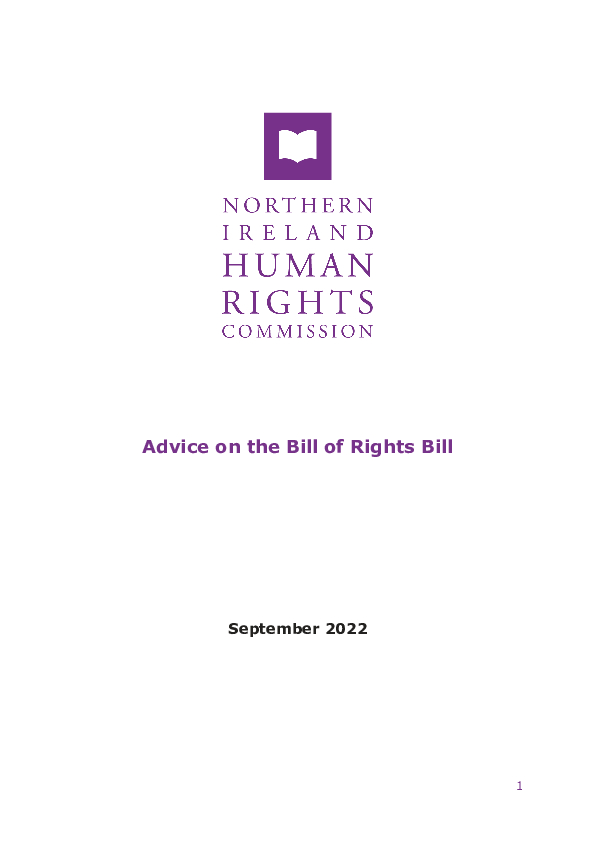NI Human Rights Commission Advice on the Bill of Rights Bill
Date produced December 2022.
Below is a summary of the recommendations.
You can also download the full document and summary advice through the links provided.
The Northern Ireland Human Rights Commission recommends:
1.3 The NIHRC concludes that the fundamentals of the draft Bill require immediate and thorough reassessment, which should take place through meaningful engagement. The result should be grounded in human rights compliance, with a view to strengthening human rights protection. The NIHRC is of the view that the present Bill is the antithesis of what is required.
2.13 The NIHRC is gravely concerned that the present Bill will significantly weaken the protection afforded.
2.16 The NIHRC advises that the protections in Protocol Article 2, while an important safeguard against the diminution of rights following UK withdrawal from the EU, are not a substitute for the comprehensive framework of human rights protections under the Human Rights Act.
2.17 The NIHRC is further concerned that, while Protocol Article 2 provides an additional framework for the protection of rights and safeguards, the weakening of human rights protections in the present Bill will create uncertainty and confusion, making the interpretation of Protocol Article 2 more challenging and may lead to a culture shift that will further reduce the robustness of human rights protections in NI.
3.6 The NIHRC advises that there is already a balanced relationship between the UK courts, ECtHR and UK Parliament by virtue of the Human Rights Act. The NIHRC is concerned that the present Bill creates an imbalance and will lead to uncertainty, prevent the domestic courts from reacting to societal developments and redirect cases away from the domestic courts towards the ECtHR.
3.10 The NIHRC advises that, irrespective of the provisions of the Bill, future ECtHR jurisprudence will continue to inform the interpretation of Protocol Article 2, due to the interpretive requirement in Article 52 of the EU Charter of Fundamental Rights regarding the ECHR and the resulting CJEU jurisprudence.
4.3 The NIHRC advises that interim measures are an early warning sign to a State that its proposed actions are incompatible with human rights and will likely be subject to legal action, during which time significant damage is possible that will require remedying. The NIHRC warns that, given the scenarios for which the ECtHR reserves interim measures, simply ignoring one could cost lives – an irremediable outcome.
5.3 The NIHRC advises that parliamentary sovereignty and separation of powers should go hand-in-hand. This is not the case in the present Bill, particularly within proposed clause 1(2)(c).
5.5 The NIHRC advises that removing the requirement for Ministers to make a statement on legislation’s compatibility with human rights removes an important monitoring mechanism that places human rights at the forefront of lawmakers’ minds.
6.5 The NIHRC advises that the present Bill’s proposals to ignore the UK’s positive obligations will weaken the protection of individuals and increase the likelihood of violations.
6.7 The NIHRC advises that while the protections of rights in Protocol Article 2 are not directly impacted by the weakening of positive obligations arising under the ECHR within the domestic legal framework, the present Bill creates unhelpful confusion.
6.11 The NIHRC advises that the present Bill’s proposal to rely solely on Parliament for deciding the appropriate balance of rights disregards the principle of proportionality and risks misinterpreting how the margin of appreciation doctrine should apply, at the expense of ensuring a fair balance is achieved between the public interest and an individual’s rights.
6.13 The NIHRC advises that the proposals within clauses 12 and 40 of the present Bill are impractical, confusing and unnecessarily resource intensive. This will in our experience not only affect public authorities tasked with implementing the laws and policies, but the ability for individuals to have their rights vindicated and, where a violation has occurred, remedied.
6.16 The NIHRC advises that majority support for retaining the Human Rights Act has been ignored within the present Bill, without justification.
7.5 The NIHRC is concerned that the tone set by the present Bill appears to place its focus on avoiding (as opposed to facilitating) an effective remedy.
8.3 The NIHRC advises that the present Bill should be revised to ensure the universality of human rights is reflected, and to prevent the demonisation of particular groups based on their ethnicity or circumstances.
8.9 The NIHRC advises that the present Bill’s proposal to elevate freedom of speech and freedom of thought, conscience and religion creates a hierarchy of rights that is contrary to human rights principles.
8.13 The NIHRC is concerned that the present Bill’s proposals to prevent human rights obligations extending to the UK Government’s overseas military operations is not human rights compliant.
8.17 The NIHRC advises that the Bill should expressly state that a decision to enable a non-jury trial should be guided by the principles of proportionality and necessity.
8.18 The NIHRC advises that the Bill should provide clarity as to when trial by jury is required.
9.6 The NIHRC advises that the present Bill does not adequately consider the Belfast (Good Friday) Agreement, and the integral role of both the Human Rights Act and ECHR in the complex fabric of the NI Peace Process and devolution. The NIHRC is particularly concerned that the present Bill appears to be incompatible with obligations under the Belfast (Good Friday) Agreement to incorporate the ECHR and provide direct access to the courts.
10.2 The NIHRC advises that the present Bill should ensure that the NIHRC has the powers to bring own motion cases without a victim.

Download Documents
Your browser is out-of-date!
Update your browser to view this website correctly. Update my browser now